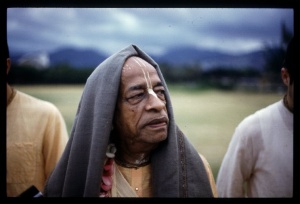750615 - Conversation B - Honolulu

A.C. Bhaktivedanta Swami Prabhupada
Prabhupāda: . . . kaler doṣa-nidhe rājann . . .
- kaler doṣa-nidhe rājann
- asti hy eko mahān guṇaḥ
- (SB 12.3.51)
After describing all the faults of Kali-yuga, Śukadeva Gosvāmī is saying: "My dear King, rājan, this Kali-yuga is full of faults just like the ocean." Kaler doṣa-nidhe. Doṣa-nidhe means this ocean of faults. Doṣa-nidhe.
- kaler doṣa-nidhe rājann
- asti hy eko mahān guṇaḥ
This is very nice verse. What is that?
- kīrtanād eva kṛṣṇasya
- mukta-saṅgaḥ paraṁ vrajet
- (SB 12.3.51)
Simply by chanting Hare Kṛṣṇa one can become free from all his contamination and go back to home, back to Godhead. This is the special advantage of Kali-yuga. This advantage is not . . . so if one has taken to this Kṛṣṇa consciousness movement, chanting, then he is saved. Not only saved—he goes back to home, back to Godhead. Not only saved, but he is dispatched in another place, where there is no danger. Padaṁ padaṁ yad vipadāṁ na teṣām (SB 10.14.58). One is transferred to the spiritual world, for them, this nonsense material world, where danger is there in every step, it is not for them. They cannot come. Just like here is epidemic, so a family is transferred to another place. So by this chanting of Hare Kṛṣṇa, Kṛṣṇa will transfer to the safety place, go back to home, back to Godhead. It is so nice. Otherwise, you become victimized. You see?
So it is not a fashion, it is compulsory. If one does not take to this Kṛṣṇa consciousness movement, then he is doomed. Now let him consider whether to take to it or not. That is his business. Kṛṣṇa is still giving the opportunity, and He has come personally, Caitanya Mahāprabhu, to distribute. That, Rūpa Gosvāmī understood.
- namo mahā-vadānyāya
- kṛṣṇa-prema-pradāya te
- kṛṣṇāya kṛṣṇa-caitanya-
- nāmne gaura-tviṣe namaḥ
- (CC Madhya 19.53)
"Oh, You are so munificent! To save us You have personally come to distribute kṛṣṇa-prema, love of Kṛṣṇa. So I offer You my respectful obeisances." Kṛṣṇa came personally, and He advised:
- sarva-dharmān parityajya
- mām ekaṁ śaraṇaṁ vraja
- (BG 18.66)
People did not care. Then Kṛṣṇa came as devotee, Caitanya Mahāprabhu—"You do like this. You take it." So even if we, after hearing so many things . . . (indistinct)
- mandāḥ sumanda-matayo
- manda-bhāgyā hy upadrutāḥ
- (SB 1.1.10)
(indistinct) . . . so anyone who does not take to this Kṛṣṇa consciousness movement, he is most unfortunate. Ātma-hā: he is killing himself. Just see. If one kills himself, who can save him? You keep your knife within the pocket, and as soon as there is nobody, you kill yourself, then who can save you? So anyone who is not taking to this Kṛṣṇa consciousness movement is killing himself, that's all. And we are canvassing, "Please take to this. Free yourself." That is our duty as servant of Kṛṣṇa. He may take or not take; it doesn’t matter. It is our duty as Kṛṣṇa's servant to speak. (pause) (end)
- 1975 - Conversations
- 1975 - Lectures and Conversations
- 1975 - Lectures, Conversations and Letters
- 1975-06 - Lectures, Conversations and Letters
- Conversations - USA
- Conversations - USA, Hawaii
- Lectures, Conversations and Letters - USA
- Lectures, Conversations and Letters - USA, Hawaii
- Audio Files 05.01 to 10.00 Minutes
- 1975 - New Audio - Released in May 2014
- 1975 - New Transcriptions - Released in May 2014